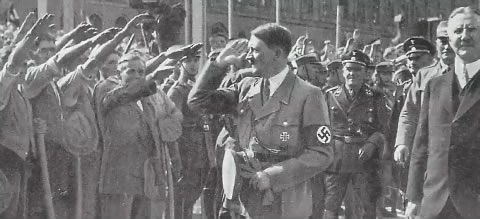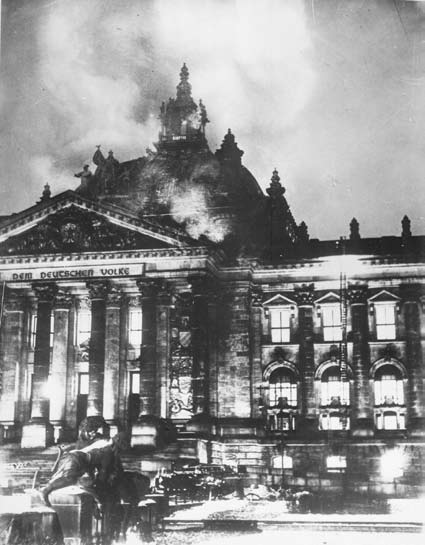This Week in History
June 16 - 22, 1933
Hitler Dictatorship Established in Germany
June 2010
This article was originally published in the EIR Magazine’s Electronic Intelligence Weekly as part of an ongoing series on American history. We are reprinting these articles now to assist our readers in understanding of the American System of Economy.
(From Volume 2, Issue Number 24 of Electronic Intelligence Weekly, Published Tuesday, June 17, 2003)
 Adolph Hitler returns the salute. Far right: Hitler's finance minister Hjalmar Schacht. |
Seventy years ago this week, the Hitler dictatorship in Germany moved in to abolish the last two major political parties, outside his own National Socialist German Workers' Party (NSDAP). On June 19, 1933, the Social Democratic Party (SPD) was dissolved; two days later, Hitler's own coalition partner, the Nationalist Party, had its offices occupied, with dissolution to follow officially on June 29. By July 14, after a few more small parties had been liquidated, Germany was officially a one-party state.
While we touched on the process that led to this result back in February 2003, when we reached the anniversary of the emergency decree which Hitler put through in the wake of the Reichstag Fire, it is well worth reviewing again. The parallels with what is happening today, and with what could easily happen if sane elements of both major political parties don't begin to organize around a LaRouche-style alternative to the neo-conservative agenda, are positively eerie.
It is worth noting that Hitler went to great pains to adopt a "legal" strategy for his drive for dictatorship. When he came out of prison after his failed 1923 "Beerhall putsch," he earned the nickname "Adolphe Légalité" for his attention to the "letter" of the law—all the while he was preparing to make himself the law.
The day after the Reichstag Fire, Feb. 28, Hitler enacted his Decree for the Protection of the People and the State. This measure suspended the seven sections of the Constitution which guaranteed civil rights. While the measure explicitly forbade stripping parliamentarians of their rights, that did not stop the Nazis from arresting Communist Party MPs, and some Social Democrats. The government also immediately began roundups of 4,000 Communist Party members.
 The Reichstag Fire. |
The "state of emergency" justification was fed by continual stories about allegedly imminent moves by the "Bolsheviks" to attempt armed rebellion, or atrocities. Not only were none of these stories confirmed, but the Hitler government never provided any of the evidence it promised, that would show that the Communists were behind the Reichstag fire. (Later, it was rather conclusively shown that the Nazis set it up themselves.)
In this atmosphere of fear, the Nazis won the March 5 elections, although with only 44% of the vote. It was the last "free" election to be held in Germany for more than 15 years to come.
But, while the majority of Germans were not rallying behind Hitler, there was no alternate leadership being put forward. And as Hitler deployed his thugs and state apparatus against one group after another, those not directly in the line of fire accommodated. That supineness was demonstrated sharply in the March 23 parliamentary vote for Hitler's Notverordnung, the Enabling Law for Removing the Distress of the People and the Reich. With a margin of 441 to 84 (all Social Democrats in the opposition), the Reichstag (Parliament) gave up its powers to Hitler's Cabinet, and even approved a provision that laws could deviate from the Constitution, with the (meaningless) caveat that the actions not disturb the prerogatives of Reichstag or President.
The assault on remaining democratic institutions, and social groups, followed in rapid-fire fashion:
*First, the Jews, who began to be excluded from the professions immediately, and on April 1, saw their shops the subject of an official boycott. The situation grew ever worse, until finally, the Nazi government undertook the extermination of European Jewry.
*Second, the state governments, which were disbanded on April 7 by decree, and received new Nazi governors appointed by the Reich.
*Third, the labor unions. After organizing a huge May Day celebration publicly dedicated to the German worker, Hitler's thugs moved in and closed down the trade union offices all around the country—on May 2. By May 23, collective bargaining had been explicitly banned, on the rationale that decision-making had to be left in the hands of the employer.
*Fourth, the political parties. On May 10, the offices of the Social Democratic Party (which had opposed the Notverordnung) were seized, and the party's newspaper shut down. Even after that the SPD voted for Hitler's foreign policy in the Parliament—but to no avail. On June 19, the Social Democratic Party was dissolved. Two days later, the German National Party—the coalition partner of Hitler's Nazi Party!—had its offices taken over, on the way to being dissolved on June 29. After a couple more small parties were shut down, the way was paved for the decree of July 14, 1933:
"The National Socialist German Workers' Party constitutes the only political party in Germany.
"Whoever undertakes to maintain the organizational structure of another political party or to form a new political party will be punished with penal servitude up to three years or with imprisonment of from six months to three years, if the deed is not subject to a greater penalty according to other regulations."
From that time forward, the dictatorship required other means of resistance. The crucial period of opportunity had been lost. Its moral lessons were summed up by the Lutheran Pastor Martin Niemoeller, who said:
"First they came for the Communists, but I was not a Communist so I did not speak out. Then they came for the Socialists and the Trade Unionists, but I was neither, so I did not speak out. Then they came for the Jews, but I was not a Jew so I did not speak out. And when they came for me, there was no one left to speak out for me."
